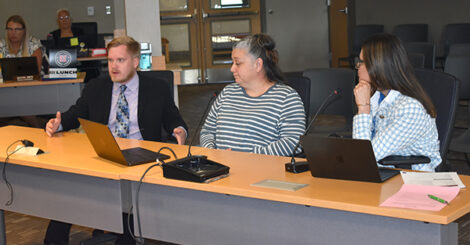MCSD school board discusses new state attendance policies with Rep. Blom, district leaders

T-R PHOTO BY ROBERT MAHARRY — Rep. David Blom (R-Marshalltown), left, addresses the Marshalltown Community School District Board of Education while MCSD Director of Student Services Anel Garza, center, and MCSD Attendance Coordinator Ely Harris-Medina, right, look on during Monday night’s meeting.
The Marshalltown Community School District (MCSD) Board of Education spent a large chunk of Monday night’s regular board meeting hearing from Director of Student Services Anel Garza and District Attendance Coordinator Ely Harris-Medina about changes in the state’s chronic absenteeism laws and how they could affect MCSD students and parents going forward. The board also had a chance to hear from Rep. David Blom (R-Marshalltown), who attended the meeting at the invitation of Superintendent Theron Schutte.
Garza explained that she, Harris-Medina and Instructional Designer David Stanfield have spent the summer working on “truly understanding” the state law and ensuring the district’s compliance. The overarching theme is that the new guidelines take a tougher stance on students missing class — an absence is an absence.
“I do want to reassure you that some of the changes that we are proposing, they were not taken lightly. And you are still going to do everything within our power to approach every attendance situation with kindness, grace, and compassion with our families. And our foremost goal with families that are maybe struggling with attendance is to be able to create a partnership in order for them to feel like we can work together on supporting their children here at school,” Garza said.
Harris-Medina told the board that poor attendance is usually a result of “a greater issue” and noted that students who are in class tend to do better both academically and in terms of social-emotional learning.
“We really want to view that framework and attendance as we’re caring about the child holistically and we believe that them being in the classroom is what’s most beneficial for them,” she said.
The new state law took effect last July, but Harris-Medina explained that the district is tweaking its policies slightly to better adhere to it. Absences related to sickness are still excused, she noted, and she then laid out some of the courses of action for students who are missing eight days or more per semester on an unexcused basis, which include communications with the county attorney’s office as truancy charges can be filed after 17 unexcused absences in a semester — “it’s not best practice, but it is the law,’ Harris-Medina said — and a meeting with the family laying out plans for improvement.
Garza then presented some of the changes they were proposing, with the first regarding family trips. Currently, the first five days of such trips are considered excused absences as long as it is communicated to district leadership at least five days ahead of time, and the new policy reads as follows: “While we value family time, the district encourages trips to be planned during school breaks to avoid missed learning and potential social-emotional disruptions. If a trip during school days is necessary and results in a prolonged absence of 8 or more days, the district may temporarily pause the student’s enrollment and re-enroll the student upon return. Parents/guardians must meet with school staff beforehand to review their child’s progress and create a plan. Parents/guardians are also responsible for ensuring their child remains engaged in learning during the absence and completes any academic work necessary to stay on track. This may include digital coursework, independent reading, or follow-up assignments and support upon return.”
The second change relates to the disenrollment policy, which currently takes effect after nine consecutive days of unexcused absences. The new proposal would allow leadership to make decisions on a more case-by-case basis without setting a specific number.
Schutte commented that the old policy could be cumbersome for families, and they’ve since instituted more of a “soft drop” system.
“If the parent comes to us and says, you know, we have to go to Mexico because (it’s) the only time we can go. We want to visit grandparents. This is really important to us. It’s gonna be more of a partnership we talk about, that it’s the parents’ responsibility to assist the child while they’re gone, and we want to offer that support. You know, that two-way communication,” Harris-Medina said. “But like Theron said, we have a system in place that we would soft drop them during that time, but again, we want to emphasize that partnership because if the student isn’t here, they can’t learn. So, how can the parent become that primary educator or make those decisions while they’re away?”
Going forward, only the following types of absences will remain excused: illness (doctor’s note is required after 3 days in a row); doctor’s appointments for student (with medical note); being sent home by the nurse or a counselor due to mental or physical health; recurring appointments in IEP plan; reduced schedule as part of an IEP plan; absence that is within a 504 plan; religious events (funerals, weddings, fasting, observations); legal reasons such as court ordered appearances and completed requirements for graduation or obtained a high school equivalency diploma.
One particularly frustrating aspect of the new law for board members is that weekday college visits are no longer considered excused absences.
“I saw the reactions about the college visits and the other absences. Yes, believe me. I also want kids to go to college and go visit colleges. So, you know, we, whenever parents have called and kind of expressed not agreeing with this policy. I always direct it back to the state representatives or your local representative just kind of giving feedback about some of those challenges,” Harris-Medina said. “Because really, we just want to focus on the unexcused absences and students who are facing, you know, challenges.”
Board member Zach Wahl also spoke about the lack of an exemption for college visits and welcomed Blom to respond. Schutte said none of the districts he has worked for have ever frowned upon their students visiting postsecondary institutions, citing his own experience putting two children through college.
“And especially based on the cost of the college, it was critically important. We and they thoroughly investigated the school to find out if it was the right fit for them. When you go to those weekend visits, those are kind of dog and pony shows, and so as always, we did that. But we also arranged, once they narrowed their list down, to have them go on what would be considered a normal day so that they can really get a feel for what the school is like, because in some cases, it was a $30,000 a year decision or maybe a $40,000 a year decision,” Schutte said. “So, what you don’t want is spending that money sending a young person to school and finding out it’s not a good fit and then having to start all over again with that process. I honestly feel like that’s still a major flaw in the current law, not crediting that when our whole goal is to get kids to want to desire to go on to some form of post-secondary education, whatever that be — whether it’s four year, two year, vocational school, whatever.”
He also hoped for more flexibility on potential absences related to athletics.
‘You know, if the kids that are doing that are being highly successful when they’re in school, and they’re doing what they need to do when they’re gone to make up for that. Why are we penalizing them by counting that towards chronic absenteeism? We’re having their name go to the county attorney. You know, three quarters of the way through the school year if that’s something that happens once a month or whatever. I mean, I think schools need the latitude to help look at the personalizing situation of every kid, and that then family and that circumstance, and try to make a determination on, how serious an offense or not, that sort of thing.”
The superintendent expressed his concern that private schools are not being held to the same standard of accountability as public school districts. Blom replied that he had not yet been elected when the law passed, but he appreciated the feedback and wondered if distance learning measures could be utilized to accommodate students who are planning to be gone for an extended period of time.
Harris-Medina said she had also received feedback from parents hoping to see more exemptions added to the list.
“It’s a significant tightening of the way it used to be because it used to be that kids were either truant, or they weren’t truant, and in order to be truant, they had to miss upwards of eight days a quarter, or 32 days a year,” Schutte said. “And now, hanging the language. There’s still truancy there, but there’s also chronic absence. And the goal is for kids not to be chronically absent because we know at that point and beyond, is where the research generally tells us it’ll have a significant negative impact generally on their education. So I’m glad we’re moving the bar in the right direction. We’re doing a better job with Ely’s assistance and the principals’ efforts engaging the families and trying to take more time as Anel said to figure out what the root cause of these situations are.”
Blom added that many MCSD families have a “unique cultural perspective” where longer trips are more common and advocated for local control, citing communities like Clear Lake where carve outs were put in place to accommodate workers in the tourism industry. Harris-Medina also thanked the families and students who have taken attendance seriously and helped to improve the district’s overall numbers.
Wahl asked if MCSD leadership was engaging with the city of Marshalltown on bus routes, and Harris-Medina and Garza have had conversations but noted that the city and the district are both short-staffed on drivers.
“You know, as a school district, we don’t have a choice. We’ve got to get the kids to school, and I think we need to talk to the city more. You know, we need to partner better and get those transportation to kids going again,” Wahl said.
Schutte ultimately didn’t feel the district could change the city’s circumstances or capacity to take on more routes.
In other business, the board:
• Approved the consent agenda as listed.
• Approved a quote from Ogden Turf & Grading LLC in the amount of $65,648.25 for the renovation of the MHS baseball and softball fields.
• Approved the updates to the 2025-2026 business procedures manual as listed.
• Approved the first reading and waived the second reading of amending the board policies on employee travel compensation and use of public funds regulation.





